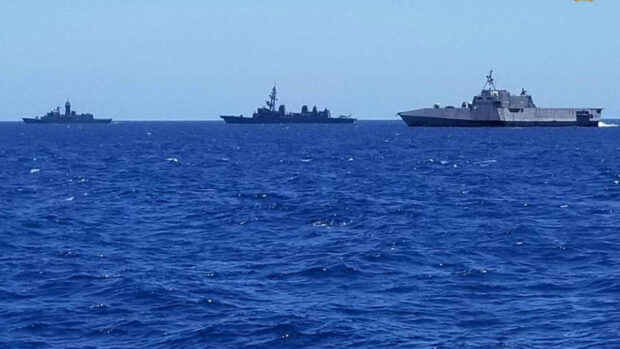PCG: PH maritime drills don’t provoke China, ‘China has always been like that’

This handout photo taken and received on April 7, 2024 shows participating ships displaying their station-keeping skills with precision as they move into different formations as part of the Division Tactics / Officer of the Watch maneuver during the first Multilateral Maritime Cooperative Activity between the Philippines, US, Australia and Japan in South China Sea. (Picture from the Armed Forces of the Philippines / AFP)
MANILA, Philippines — The Philippines’ deepening security ties with the United States (US) and other countries are not linked with China’s escalating aggression in the West Philippine Sea, a Philippine Coast Guard (PCG) official said on Monday.
In a radio interview, PCG spokesperson for the West Philippine Sea Commodore Jay Tarriela dispelled talks that Manila’s cooperative maritime exercises with other countries in the disputed waters are provoking an already irate China.
“It is wrong to conclude that these kinds of exercises agitate China, escalate tensions, or provoke them. Even without our deepening security alliance with the United States or any like-minded states, China has always been like that,” Tarriela said in a mix of Filipino and English over at Radyo 630.

The PCG official was pertaining to Chinese maritime forces’ recent harassment of Philippine vessels within the Rozul Reef on April 4 where Chinese ships harassed Filipino fishermen supporting the PCG and Bureau of Fisheries and Aquatic Resources vessels on a mission to drop floating aggregate devices in the area.
Article continues after this advertisementREAD: China Coast Guard harassed PH ships anew, says PCG official
Article continues after this advertisementIn the same interview, Tarriela said Chinese Coast Guard ships performed close-quarter maneuvers near Filipino vessels and threatened the fishermen as if they were going to use the water cannon on them.
The incident happened weeks after Philippine forces announced the conduct of naval drills with other countries inside the Philippines’ territorial waters as part of this year’s “Balikatan” (shoulder-to-shoulder) exercises.
READ: Philippine, US, French navies to sail in West PH Sea for Balikatan
A few days after the harassment, Manila conducted a Maritime Cooperative Activity (MCA) with Australia, Japan and the US on April 7 within the Philippines’ exclusive economic zone.
Tarriela recalled that despite the previous administration choosing not to strengthen its defense partnership with the US, Filipino troops still faced harassment from Chinese naval vessels.
“With that kind of historical background, regardless of whether we engage in these activities with other countries… these activities in the West Philippine Sea, China would still want to implement their imaginary 10-dash line […],” he said.
“There is no connection that China is being provoked because we have these security activities with other countries,” he explained.
Tarriela, however, said Philippine forces still do not know how China will react to the Balikatan exercises that Manila would jointly conduct with the US and France, and the recent MCA with two other countries in the Pacific region.
“(But) whatever action they are going to (dish) out, we are not going to be deterred. We are not going to yield to whatever provocative or illegal action that Chinese maritime forces would do here in the West Philippine Sea,” he stressed.